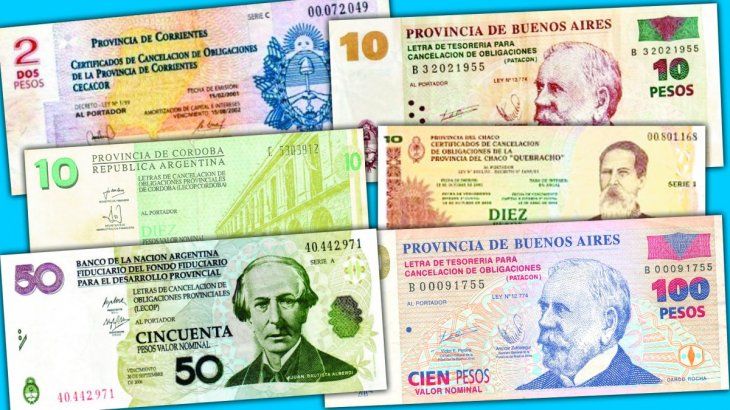The idea was already being debated in the market and, finally, this Wednesday, The Executive Branch of La Rioja sent to the provincial Chamber of Deputies the bill that approves the issuance of the quasi-currency, as the governor, Ricardo Quintela, had anticipated, and it is likely that, soon, other provinces will follow the same path. Given this news, some public financing experts analyzed, in dialogue with Ámbito, what the economic impact of the measure would be and explained how these instruments work.
As explained Rafael Flores, economist specialized in financial administration of the public sectorto Ambit, “Quasicurrencies are bonds issued by the State, which are usually presented as mandatory acceptance for suppliers, contractors and public employees” and are used to cover the debts that the provincial administration has with its suppliers or for the payment of salaries.
“In the closest experience we have, which is 2001-2002, the quasimondas worked to provide greater liquidity to the provincial governments because there were no pesos,” Flores recalls. The truth is that the issuance of these instruments implies generating debt in the future.
Quasicurrencies: a solution to a financial problem
So why are provinces evaluating this possibility? It happens that what worries the provincial administrations is what are going to be the consequences of the economic plan that the Government is implementing.
“When President Javier Milei proposes that a major adjustment will have to be made, we must analyze the effect this will have on the public treasury. Because activity falls and, consequently, the collection also decreases,” he details. Hernán Letcher, director of the Center for Political Economy (CEPA).
And, in the middle, the impact on social and salary matters is serious. Thus, CEPA points out that the provinces are evaluating that the impact of current measures, which imply a strong cut in Co-participation funds provincials (whose continuity is even under debate) are going to be very harmful.
ricardo-quintela-isolated-1-758×426.jpg
Ricardo Quintela, governor of La Rioja.
Given this panorama, They are preparing with a reinforcement of fiscal accountssince they see that they are not going to be closed to comply with and contain essential expenses, such as those of salaries. In fact, the authorities of The Rioja had indicated a few days ago that they did not rule out resorting to the issuance of quasi-currencies in front of the financial difficulties that runs through the province.
In that sense, The norm raised to the Rioja Legislative by Quintela seeks to generate an instrument to pay part of the salaries of public employees. This is a text that has the support of the mayors of the province and that, if approved, will empower the administration to issue physical and digital bonuses. cancellation of debts for up to $15,000 million.
On this occasion, it was established, for example, that The bonds will be issued to bearer and nominal according to their format and serve to cancel debt: in the case of salaries, they will be computed for up to a maximum of 30% of the net remuneration. And, on the other hand, it is established that the holders of This quasi-currency will be able to cancel all types of tax and non-tax obligations towards the Provincial State with it.
Keys to the success of the broadcast
Flores points out that, for its issuance “only a legislative agreement is required”For this reason, the La Rioja project was presented for treatment in Congress for the bill that sets the conditions. “However, the acceptance that this instrument has by society is key,” he explains.
That It depends on the trust there is in the Government and in the implementation program that is implemented. “It happens that it is not the same as being a very small percentage in relation to the amount of pesos in circulation. The greater the proportion with respect to the pesos, the less value these instruments will have,” he indicates.
And, on the other hand, something that is weighed, in general “the duration that the use of this instrument will have and the redemption period that the Government considers”, which are directly related to the confidence that creditors have in the economy in which they are implemented. All these factors influence the parity that this quasi-currency will have with the peso.
“If it is perceived that it is an issue related to solvency problems and not to financial issues, the value will be low and may deteriorate over time,” says Flores. Thus, he recalls that, in the experience of the quasi-currencies that were issued in 2001-2002, many provinces issued this type of instruments and mentions that there were differences in the value of one and the other in relation to the financial situation of each government.
Possible effects of the issuance of quasi-currencies vs. a greater evil
A report of the Mediterranean Foundation recently analyzed the particular case of The Rioja and they warn that “it seems to respond to a provincial pattern extremely dependent on co-participation and discretionary transferswithout fiscal slack (compared to the rest), with a productive profile with a very limited export bias, strong dynamism in the creation of public employment and a decline (in per-capita terms) in private employment, occupying rear positions in the rankings that They measure the level of salaries and training of human resources by province.”
It is not yet known what the consequences of this development will be in the province, but the consulting firm anticipated that It is to be expected that economic agents will seek to get rid of these papers sooner. than, of other currencies, so they expect the speed of circulation to increase, enhancing the discount imposed by the market on the value of those bonds.
Lecop banknotes.jpg

In the years 2001-2002, several provinces issued quasi-currencies due to a lack of pesos.
In this context, they warned that The local population will suffer an additional inflationary blow to the one imposed by the devaluation dynamics of the peso itself. and that companies established in the province will see national taxes become more expensive in terms of quasi-currency because to pay (national taxes) they will have to exchange local bonds below par.
For La Rioja it is a necessary decision and it is preparing a demand to the Government
However, Letcher points out that ““No one is going to consider issuing bonds if they do not consider what the result would be if they did not do so.”. That is, the lesser evil is chosen, since it points out that “it is always better not to issue debt in the future.”
Quintela based the need for this measure on “the abandonment of the Nation”, which implies the cut of funds for the provinces as a consequence of the cuts to public works and the project to modify the management of Co-participation funds, and the urgency of having financial instruments to face the critical economic situation while the financial situation normalizes.
And it is that Quintela will present a lawsuit in the Supreme Court against the Nation by $9.3 billion owed from Budget 2023 by the national government to La Rioja in compensation for the sharing point that the district lost when this distribution system was created in the 1980s.
Source: Ambito




